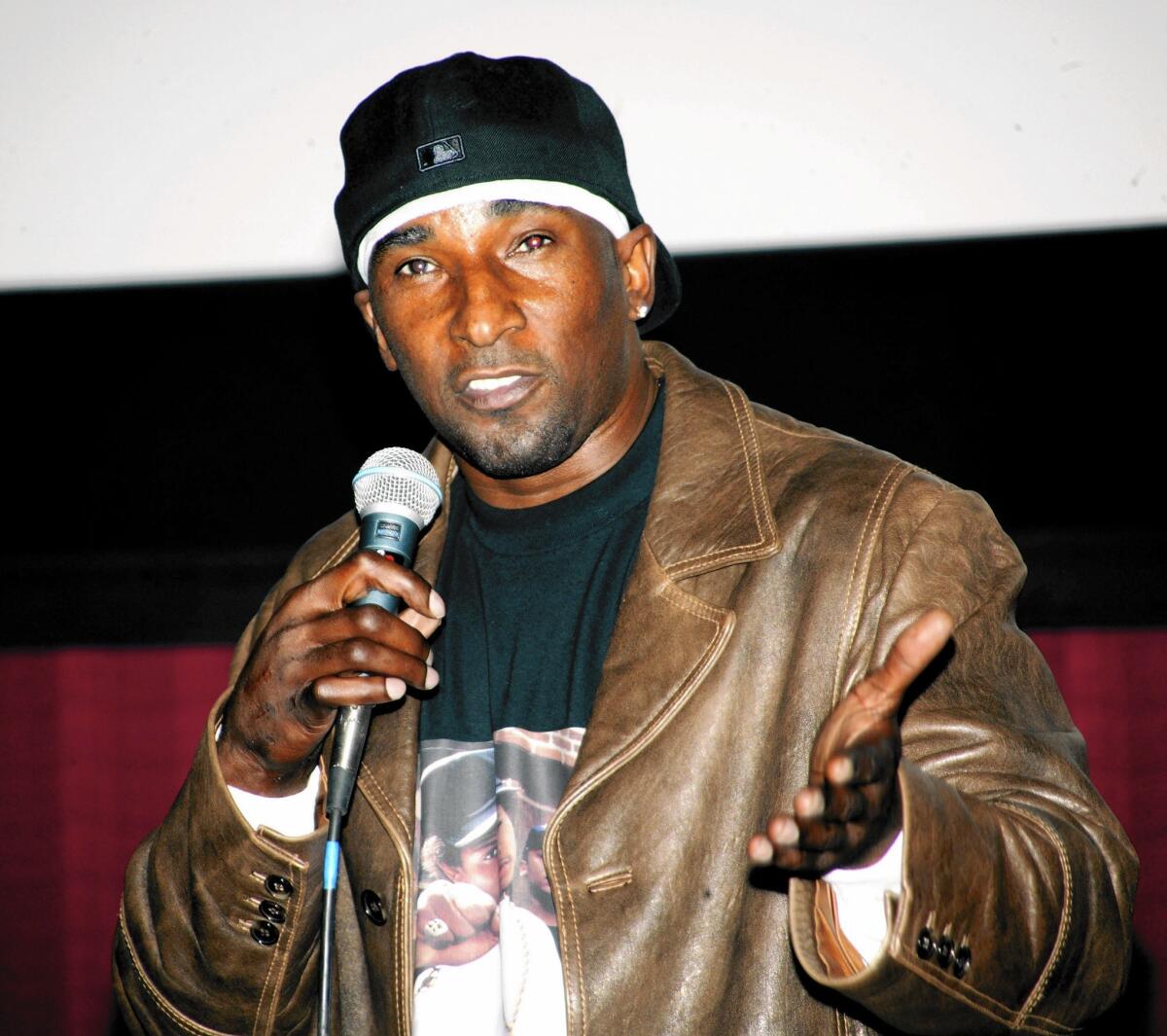‘Suge’ Knight prosecutor uses time-tested strategy on recanting witness

In court, witness Cle “Bone” Sloan, contradicting earlier comments to police, said he couldn’t remember key details of the incident that injured him and left another man dead.
For homicide investigators, Cle “Bone” Sloan was a key witness in their murder investigation of Marion “Suge” Knight. Sloan told them the onetime rap mogul had threatened to kill him immediately before running over him and another man with his truck.
But during a preliminary hearing this week, Sloan suddenly became more reticent. He refused to say Knight ran him over and insisted that he could not remember key details of the incident that left him with serious injuries and killed Terry Carter. Under questioning from prosecutors, Sloan cried on the witness stand and declared he was not a “snitch.”
Despite that, a judge ruled Thursday that Knight should stand trial on murder and attempted murder charges.
But prosecutors still face an obstacle as their case heads to trial: Dealing with a reluctant witness.
Sloan’s testimony highlights what legal experts say is a frequent occurrence in the justice system as witnesses insist they have forgotten what they saw or change their stories. Some recant out of fear of retaliation, but experts say others are motivated by a powerful unwritten code against cooperating with police and prosecutors.
Recantations are particularly common in cases where witnesses, the accused or both have gang affiliations — and occur even when witnesses are no longer living the gang lifestyle or are called to testify against members of rival gangs.
Prosecutors have long used a reliable strategy for dealing with witnesses who recant, a problem that is so common that it has become “just part of the fabric of the system,” former Los Angeles County Dist. Atty. Steve Cooley said.
One of the prosecutors in Knight’s case adopted the method during the preliminary hearing when she read aloud the transcript of Sloan’s interview with investigators and played a recording of his statement for the judge.
Her approach dates back decades and has proven highly effective, Cooley said.
In legal circles, the process is called “greening” a witness, named for the 1970 U.S. Supreme Court decision in California vs. Green that allowed lawyers to admit previous statements a witness made into evidence if they conflict with the witness’ testimony. The tactic has played key roles in domestic violence cases in which victims deny previously telling police that they were abused, as well as in gang-related prosecutions.
“This is going to sound crazy, but I would rather they lie at trial,” said Dana Orent, a former detective for the Pasadena Police Department who now testifies as a gang expert in court. “If he goes up there and lies and then you play the tape, then wow, it’s so much more powerful.”
In the Knight case, prosecutors are dealing with an unusual witness who has openly campaigned against gang violence but continues to have strong ties and influence in the gang world.
Sloan — who had acting roles in the movies “Training Day” and “End of Watch” — also directed and narrated the 2005 HBO documentary “Bastards of the Party,” an oral history of gang violence in L.A. In the film, Sloan says that his father died when he was 4 and that he joined the Athens Park Bloods at 12 or 13.
In 2007, Sloan told NPR that his straddling of the gang and activist worlds requires a delicate balance.
“I want to keep all my credibility,” Sloan said. “I want to keep my social ties.... I just don’t break the law.”
Surveillance footage from a security camera at Tam’s Burgers in Compton shows Knight’s truck plowing into Sloan and Carter. Sloan, 51, suffered serious injuries to his legs and head.
Sloan’s attorney, Stephen Bernard, said he thinks his client believes the video is powerful enough evidence against Knight in the murder case and is upset prosecutors called him to testify.
“He just didn’t want to be known as someone who is working for prosecutors or the police,” Bernard said, “when in his mind there was no need to do this.”
Alex Alonso, a gang expert who runs the website Streetgangs.com, said he’s known Sloan for two decades and believes his reluctance to testify is not about fear but principle.
“He’s not scared of the ramifications,” Alonso said. “It’s just not in his DNA to do it.”
An aversion to snitching is far from unique to gangs, Alonso said. Members of many groups — including law enforcement — bristle at the idea of tattling or whistle-blowing, he said.
“It goes back to our childhood,” he said, “This is human nature.”
Sloan told detectives that earlier on the day of the killing he had asked Knight to leave the set of a commercial for “Straight Outta Compton,” a biopic about the pioneering gangsta-rap group NWA.
In court, Sloan denied telling Knight to leave the set.
He told investigators that he confronted Knight later at the burger stand and punched him. During the fight, he said, Knight told him he would kill him.
Sloan testified he may have embellished what he told detectives and, under questioning by Knight’s attorney, said he was not saying that Knight ran him over.
Knight’s lawyer, Matthew Fletcher, argued that Sloan and several other men attacked his client and Knight acted in self-defense.
“There is no intent to kill,” Fletcher said. “Mr. Sloan is without question the initial and consistent aggressor.” Deputy Dist. Atty. Cynthia Barnes noted that the surveillance video captures Knight’s truck backing up over Sloan and then pulling forward, driving over Sloan again, and fatally striking Carter.
Superior Court Judge Ronald Coen said Knight’s actions didn’t look like an attempt to escape but “an attempt to murder.”
The judge ruled there was enough evidence for Knight to stand trial — but not enough, he said, to justify Knight’s $25-million bail. He lowered the amount to $10 million and scheduled Knight’s arraignment for April 30.
More to Read
Start your day right
Sign up for Essential California for news, features and recommendations from the L.A. Times and beyond in your inbox six days a week.
You may occasionally receive promotional content from the Los Angeles Times.







